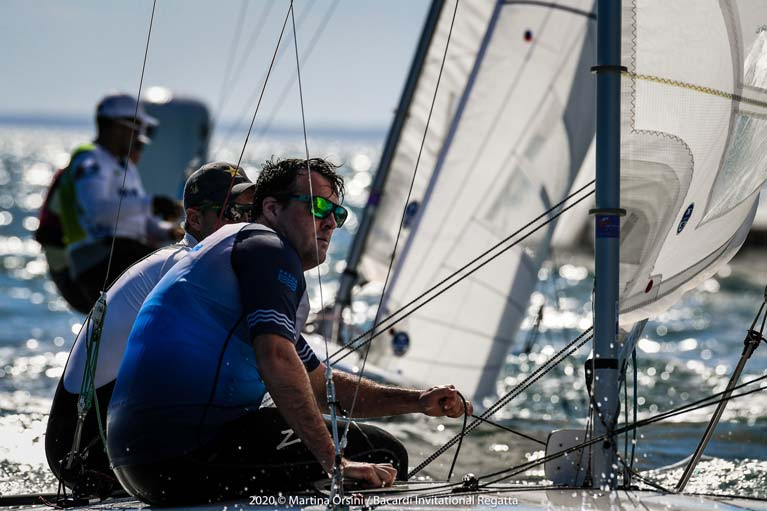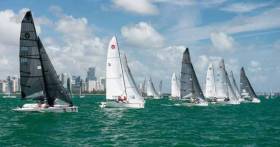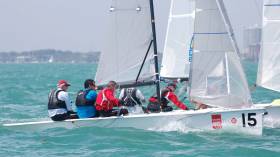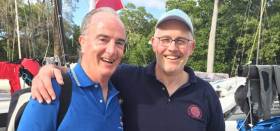Displaying items by tag: viper 640
Royal Cork's O'Leary Brothers Seventh at Bacardi Cup
Royal Cork Yacht Club's Peter and Robert O'Leary are seventh overall after four races sailed at the 93rd Star Bacardi Cup in Miami, USA yesterday. The Cork Harbour duo scored an eighth in race four, their third top ten of the series so far. Meanwhile, the O'Leary's father, Anthony along with third brother Nicholas, have started racing in another fleet at the Cup and they are currently third overall in the Viper 640 class.
On Thursday, the Star Class was joined by the complete line-up of one-design classes racing at the Bacardi Invitational Regatta. Taking on their first day of racing were the J/70, Melges 24, Viper 640, and, brand new for the race track this year, the VX One sports boat, AV8 and Windfoil classes. The blend of sailors battling it out for glory on Biscayne Bay is phenomenal, with a mix of professional rock stars and super-talented Corinthian teams.
For 2020, the Bacardi Cup and Bacardi Invitational Regatta have welcomed a record-breaking 175 entries and well over 500 sailors representing 19 nations, proving its status as the sport’s most popular Spring regatta. Racing is across four-course areas, with the Star Class on a dedicated track and course sharing for the Melges 24 and J70, Viper 640 and VX One and AV8 with the Windfoil.
The Bacardi Invitational Regatta was in full swing today and all of the classes were able to get a taste of the joy of racing on Biscayne Bay as Miami showcased its Caribbean genes of heat, humidity and a steady 9-10 knot breeze to sailors from around the world.
Mateusz Kusnierewicz (POL)/Bruno Prada (BRA) made it another big day in the Star Class, as they seized the bullet to make it three wins in a row and lead the fleet on a perfect scorecard of 3 points. The pair have shown classy form and today secured a critical points edge with just two races to go to crown the 93rd Bacardi Cup champions. Behind the order of play remains the same at the end of the day as at the beginning with Eivind Melleby/Joshua Revkin (NOR) and Augie Diaz/Henry Boening (USA) pushing hard in second and third. It will now take an epic assault to unseat the reigning Star Class World Champions Kusnierewicz and Prada from their top billing, but one the chasing teams are willing to try. Among them are Paul Cayard (USA)/Pedro Trouche (BRA), who sit in fifth overall after a disappointing 17th finish yesterday. But they rebounded to deliver their best day, a 2nd place, and proved they can still fight amongst the best.
“This might be my 25th Bacardi Cup, surely the first one was in 1980,” commented Olympian, multiple World Champion, Louis Vuitton Cup and Whitbread Round the World winner Paul Cayard. “We had a very bad day yesterday when I could not put us in a good position at the start, but I am happy about today, our best result so far. It’s just that Mateusz and Bruno are so fast, and with three wins, we can all just fight to be second best.”
Out on the track first were the Melges 24 and J70 who raced in the south of the bay, starting out in a fluky 5-6 knots before the breeze steadied to 9-10 knots. Three races in the Melges 24 saw the big hitters out front early on, with Bora Gulari and his team of Kyle Navin/Norman Berg/Ian Liberty and match racing superstar Taylor Canfield setting the pace to secure two wins and a second place to lead overall. They know what it takes to win, having wrapped up victory in one of the Bacardi Winter Series warm-up events in January 2020. Just 2 points behind are KC Shannon/Jackson Benvenutti/Ben Lynchi/Tom Sawchuk/Elizabeth Whitener, with Peter Duncan/ Victor Diaz de Leon/Mattero Ramian/Carlos Robles/Willem Van Waay in third. Duncan and crew race in Miami fresh from their Melges 24 victory at last month’s 2020 NOOD Regatta where they nailed an all-win scorecard.
The aptly named ‘Eat Sleep J Repeat’ helmed by reigning J/70 World Champion Paul Ward (GBR) with crew of Ruairidh Scott/Ben Saxton/Mario Trindade were the pace setters in the J70 fleet, stamping their authority on the chasing pack with a 2,2,1 scorecard, but it was no easy racing. Ward’s crew boasts plenty of successes, but so do the other teams with World Champions and Olympians aplenty. Second to Ryan McKillen/John Wallace/Sam Loughborough/Mark Mendelblatt (USA) and third to Chile’s Pablo Herman/Luis Felipe/Felipe Echenique/Will Welles.
“It was a really, really good day and we finally started to work out how to sail out here,” grinned Paul Ward. “We always love coming to Bacardi Cup because it is cold, wet and miserable at home and the sun is shining here and we have some fantastic racing.”
Anticipating the races ahead, Ward continued, “There are two more days and there are a lot of fast boats, which is why we love coming out here as the competition is great. We’ve just got to see how we go and the boys are going well, everyone’s enjoying themselves and the bar is open, so life is good!”
Viper 640
In the Viper 640 fleet, it was Will Graves/Ryan Cox/Greg Dair who set the early running, with results of 1,2,3, but the defending Bacardi Invitational Champions Geoff Ewenson/Mary Ewenson/Tyler Bjorn soon settled into their groove to claim wins in races 2 and 3. This fleet is renowned for its camaraderie, so plenty of post-race analysis chat flows helped along with the Bacardi hospitality.
“Today was nice, a beautiful building breeze out of the east which took a bit longer than expected, but eventually it came in,” commented Geoff Ewenson who is a familiar face in Miami, counting fifteen appearances at the Bacardi Cup. “We were caught a little bit out of tune in the first race, but we figured it out throughout the race. We knew the boat didn’t feel quite right, so we worked hard after the first race and made some adjustments to the rig tune and were able to find our speed and were particularly fast downwind.”
An all-American line up is contesting the VX One fleet, and reflecting the closeness of racing a different team won each of the three races. Matching scorecards to Ched Proctor/David Guggenheim/Monica Morgan and Sandra Askew/Kyle Kandt/Jason Curvie (USA) in the first two races was ultimately settled by a 2nd place finish for Proctor and crew in race 3 to give them the series lead. Second to Askew/Kandt/Curvie on tiebreak advantage over Bill Wiggins/Jeff Eiber/Farby Cappellin.
“Miami is my favourite place to go sailing,” smiled Proctor, before Guggenheim chipped in, “The water is warm, the breeze is strong!”
“It was pretty nice today, as the first two races were fully powered up,” continued Proctor, “although the last race we were a little depowering. It was a pretty perfect day for sailboat racing. This is the best place in North America to sail in the winter.”
Brazil’s Gabriel Browne produced a punishingly accurate performance to claim four back to back race wins in the Windfoil Class. Hunting him down in each race with four second places was Alexander Temko (USA) with Justin Ahearn (USA) in third overall.
“We have a lot of participation at this event, as it is our first time with the big boat fleet,” commented Alex Morales, representative of the Windfoil Class. “We have some of the top guys from Brazil and the USA, plus some juniors from the Biscayne Bay Yacht Club who are doing their first event in this Olympic windsurfing class. We are super excited, we feel really welcome and are really pleased to be part of the Bacardi Invitational Regatta.”
Plenty of kite racing pedigree in the hydrofoil Cabrinha AV8 Class and joining the AV8 are legends Damien Leroy and Jon Modica, who make their AV8 racing debuts amongst the normal class veterans. Leroy was fast off the start and superbly foiled his way to knock out four race wins. Second to Brendan Healy (USA) with Kent Marcovich (USA) in third.
The Bacardi Invitational Regatta marks the third major event of the season for the Cabrinha AV8 class. The AV8 is a strict one-design hydrofoil racer, positioned as an affordable and accessible form of hydrofoil kite racing. Racing is tight, tactical and fast with speeds easily reaching the 30-knot range in as little as 10 knots of wind speed.
Tonight teams will enjoy another memorable party night hosted by Bacardi at Shake a Leg Miami. Racing continues on Friday 6 March, with one race for the Star Classes and three to four races for all other fleets.
Bacardi Cup 2020 – Star Class Top 3 – After 4 races
Mateusz Kusznierewicz / Bruno Prada (POL 8548) – 5 pts
Eivind Melleby / Joshua Revkin (NOR 8234) – 10 pts
Augie Diaz /Henry Boening (USA 8509) – 14 pts
J70 – Top 3 – After 3 races
Eat Slepp J Repeat (GBR 1127) – Paul Ward / Ruairidh Scott / Ben Saxton / Mario Trindade – 5 pts
Surge (USA 179) – Ryan McKillen / John Wallace / Sam Loughborough / Mark Mendelblatt – 12 pts
New Wave (USA 456) – Pablo Herman / Luis Felipe / Felipe Echenique / Will Welles – 17 pts
Melges 24 – Top 3 – After 3 races
USA 420 (USA 420) – Bora Gulari / Kyle Navin / Norman Berg / ian Liberty / Taylor Canfield – 4 pts
Shaka (USA 801) – KC Shannon / Jackson Benvenutti / Ben Lynchi / Tom Sawchuk / Elizabeth Whitener – 6 pts
Raza Mixta (USA 820) – Peter Duncan / Victor Diaz de Leon / Mattero Ramian / Carlos Robles / Willem Van Waay – 15 pts
Viper 640 – Top 3 – After 3 races
USA 293 (USA 293) – Will Graves / Ryan Cox / Greg Dair – 6 pts
Evil Hiss (USA 297) – Geoff Ewenson / Mary Ewenson / Tyler Bjorn – 8 pts
Antix (USA 296) – Anthony O’Leary / Ben Field / Nicholas O'Leary – 17 pts
VXOne – Top 3 – After 3 races
VX1 – (USA 187) – Ched Proctor / David Guggenheim / Monica Morgan – 6 pts
Flying Jenny(USA 277) – Sandra Askew / Kyle Kandt / Jason Curvie – 10 pts
Send it (USA 160) – Bill Wiggins / Jeff Eiber / Darby Cappellin – 10 pts
Cabrinha AV8 – Top 3 – After 4 races
Damien Le Roy – 4 pts
Brendan Healy – 10 pts
Kent Marcovich – 14 pts
Open Windfoil – Top 3 – After 4 races
Gabriel Browne – 3 pts
Alexander Temko – 6 pts
Justin Ahearn – 9 pts
Royal Cork's O'Leary Tenth in Viper Pan-American Championship
Sailed from March 9-11 as part of Bacardi Miami Sailing Week the EFG Viper Pan-American Championship is the culmination of a year’s worth of qualifying regattas in Australia, Europe, and North America and attracted its regular Irish entry for the week long regatta in Florida.
Royal Cork's Anthony O'Leary, crewed by Ross McDonald from Howth Yacht Club and David Hassett from Cork Harbour (now living in the US) finished tenth in the 23–boat fleet.
A second in race five of the nine race series being the Irish boat's top score.
Royal Cork Viper Trio Eighth in Miami's Bacardi Sailing Week
Cork Harbour's Anthony and Robert O'Leary and Tom Durcan have finished in the top eight of the competitive Viper 640 Bacardi Sailing Week fleet. The overall result brings a successful conclusion to a week of racing in Miami, Florida where the Royal Cork YC trio also finished second in the EFG Winter Cup regatta the previous weekend. O'Leary was pipped for the overall EFG win by Lawrence and Luka Crispin and Hector Cisneros, a British entry that swept the Viper Miami week of sailing.
O'Leary counted six top ten results in the eight race Bacardi Cup, missing seventh place in the 29-boat fleet by just two points.
After turning in a dominating performance for the EFG Winter Cup, Crispin and crew controlled Bacardi Miami Sailing Week Regatta which was also the EFG Viper Pan-American Championship.
By placing well in two Pan-Am qualifiers (the NAs and the Winter Cup) Lawrence, Luka and Hector will also be taking home the Pan-Am Champs as they return to the UK and Stone Sailing Club.
The Viper 640 class is coming to Volvo Cork Week in July.
Meanwhile, for the week that's in it, we very much like the spinnaker on Trey Sheehans' J70 Bacardi Sailing entry from Put-in-Bay Yacht Club, Ohio.
J/70 at BACARDI Miami Sailing Week
Posted by IPHOTOJOURNALIST on Saturday, 12 March 2016
Royal Cork's Viper 640 Second in Winter Cup Regatta
Anthony O'Leary, Robert O'Leary and Tom Durcan were narrowly pipped for an overall win in the Viper 640 EFG Winter Cup Regatta in Miami at the weekend. The Royal Cork trio sailing 'Antix' finished second overall where there were two days of big winds in a 16–boat fleet. O'Leary was beaten by the UK's Lawrence Crispin, third was John Dane, the USA Star 2008 Rep from Beijing.
The Crosshaven helmsman is back on Biscayne Bay tomorrow for the 2016 Bacardi Cup regatta where he finished seventh last year. (Gremlins caused an earlier misreport of the 2015 results). Strong winds are forecast for this week's event.
The Viper 640 sportsboat fleet is coming to Volvo Cork Week this July.
Viper 640 Sportsboat to Feature at July's Cork Week
The Viper 640 One Design Sportboat will feature in Ireland this Summer at Cork Week Regatta in July. The class has added the Irish date to its international calendar.
Not yet a class in Ireland. the international Viper 640 is a two to four person, high-performance sports boat akin to the SB20 and 1720 sportsboats popular here.
There are 240+ Vipers in the USA and Canada, 28 in Australia and newer fleets underway in UK, Europe, Bermuda and beyond.
In addition to the UK 2016 sailing programme, the Viper has a heatlhy international regatta programme planned for 2016. Last March, Afloat sailor of the year Anthony O'Leary of Royal Cork, sailing with Howth's Dan O'Grady and Cork clubmate Tom Durcan, competed at Miami race week in the Viper. The sole Irish trio's best individual result was a fourth which they achieved twice in races two and six of the nine race series.
Viper boats have previously competed in the UK Miami Bacardi Cup, Parkstone Regatta, Cork Week, Cowes Week and Torbay Week. In 2015, the locally based Viper at Falmouth won the Keelboat IRC Falmouth Regatta outright after three days of very strong winds in Falmouth Bay.
A UK 2016 sailing programme has been announced and there is an international regatta programme planned for 2016 too.
Following extensive trials in the USA, the Gulf Yachting Association (a group of 20 plus US Gulf-based clubs) have chosen the Viper 640 as their new club boat for the future, replacing the previous "Flying Scot". This, together with a very active US sailing programme, has increased demand for the boat throughout the USA and Rondar are now in full production.

































































